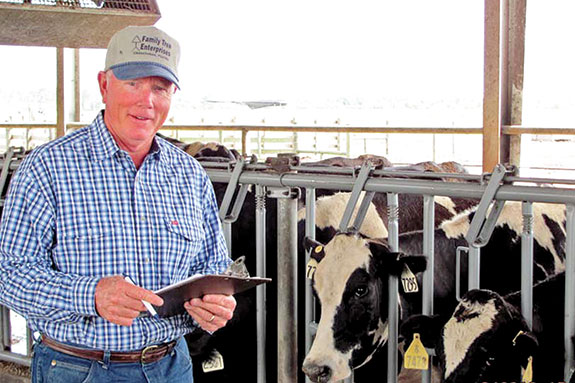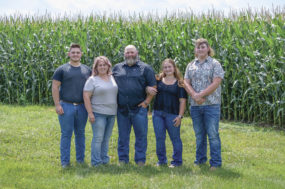The Beef Checkoff Program was established as part of the 1985 Farm Bill. The checkoff assesses $1 per head on the sale of live domestic and imported cattle, in addition to a comparable assessment on imported beef and beef products. States retain up to 50 cents on the dollar and forward the other 50 cents per head to the Cattlemen’s Beef Promotion and Research Board, which administers the national checkoff program, subject to USDA approval.
Florida dairyman a beef quality award winner
Okeechobee, Florida, may seem like a world away, but this month Louis “Woody” Larson of Family Tree Enterprises, the checkoff’s 2012 Dairy Beef Quality Assurance (BQA) award winner, brings his dairy story a little closer to home by taking us on a tour of his operation in an effort to get to know his values and mission when it comes to producing safe, healthy dairy beef products.
Starting out

Larson grew up in the dairy business. His father started Larson Dairy, Inc. shortly after World War II. Larson began dairying full-time in 1973, after graduating from the University of Florida.
The family-owned business grew to a peak of 10,000 cows milking in multiple operations, and in 2001, for family and estate-planning reasons, they decided to split the operation.
Woody took one dairy, his brother took another, and the rest remained with Larson Dairy, Inc. – of which Woody is still a major stockholder.
Woody spent 28 years with Larson Dairy, Inc. before starting his own business, Family Tree Enterprises LLLP, in 2001 with a 1,300-cow grazing dairy.
“I have always liked beef cattle, too – started acquiring ranch land in the late ’80s and have a ranching operation as well,” Larson says. “My wife, Grace, and I have continued to grow our business, acquiring another local dairy farm in 2002 and a third in north Florida in 2005.”
Family Tree Enterprises now consists of three dairy farms with 4,600 adult cows and 3,000 replacement females on 3,100 acres.
Larson says growing and maintaining herd size has been a challenge. “We’ve placed emphasis on herd health and reducing cattle stress.
Our herd health program takes a preventative approach, emphasizing hygiene, vaccination and cow comfort over antibiotic use. We have written protocols for vaccinations and procedures.”
BQA has been important for Larson from the start. He and his veterinarian have been the main educators and continually train employees at the various farms.
In addition, the dairy brings in outside trainers and encourages herdsmen to attend specialized workshops such as the Florida Beef Council-sponsored Dairy BQA trainings for Spanish-speaking employees.
Other innovations in their business include reworking the cattle-handling facilities by installing used rubber belting on fences and chutes to help prevent bruising and injury. The dairy’s floors are grooved and gates have been positioned to avoid tight turns.
“In 2005, the market for our day-old Holstein bull calves vanished. We were faced with a decision to destroy them or try to raise them profitably.
We chose to raise them and went to work expanding our calf facilities to handle the bulls,” Larson says. “It’s a long way from south Florida to Texas, and freight is a challenge.
It has become a personal crusade for me as I have tried to help other Florida dairymen find a solution. I’ve coordinated many trips and contacts to find and develop a market, but reputable, healthy calves are key.”
Last year, Family Tree Enterprises shipped more than 1,500 head of young dairy steers to feedlots.
“BQA is a never-ending process. New people need to understand ‘why’ you do things a certain way,” Larson says. “BQA is really about food safety to me.” PD
Visit Youtube to get to know more about Woody. Visit their website for more about the Dairy Beef Quality Assurance program. For more information about your Beef Checkoff, visit their website .
Photo courtesy of the Beef Checkoff.



